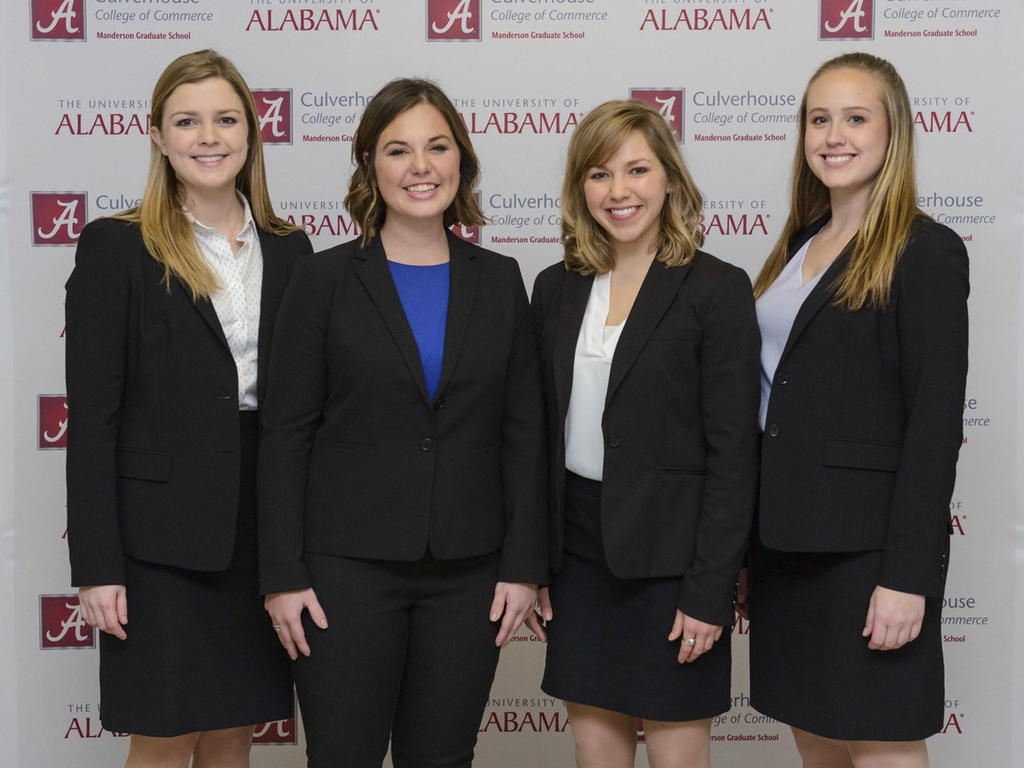Pack your clothes and your classroom learnings. Climb in a car. Drive to Tuscaloosa, AL. Sleep for only four hours. Create and solve a business problem. Win $2,000. Sound like a challenging weekend?
The scenario played out recently for a four-member team of Rhodes students participating in the Culverhouse Leadership Diversity Competition. Economics/commerce and business (ECB) double majors Maggie Butcher ’16 and Stephanie Coma ’16, joined commerce and business (CB) majors Haley Menz ’16 and Emily Rizer ’16 to earn third-place honors for their solution to a business problem they created for Campbell Soup Company. In addition, Butcher was awarded Best Presenter, and ECB double major Adil Khan ’16, a member of a second Rhodes team, was tapped for Best Q&A. Other members of Khan’s team were CB major Alec Marshman ’17, Jason Johnson ’16 (international studies major), and Alden Knipe ’16 (ECB).
“The thing that made this competition difficult,” says Rizer, “was that we were not presented with a particular problem, like most of the cases we have been exposed to. We had to determine that problem before even finding a solution.”
To do so, the team, which was randomly given Campbell’s for its project, maximized a Thursday night and a full Friday researching the company, developing a problem to solve, and creating a PowerPoint presentation for the competition. The only parameters given to them were to resolve their problem within a 24-month window with a $1 million budget.
The presentation was due at 6 a.m. on Saturday, the day of the competition. Both nights were long. “We started by researching Campbell’s—recent acquisitions, financials, annual reports, financial stability, marketing strategy, organizational structure, their main competitors over the last years—anything that seemed relevant,” says Rizer.
Like many, the team puzzled over what could be “wrong” with such a tried-and-true product. Coma explains: “We found that the name and brand of its classic red and white soups was actually holding the company back with its new products that try to appeal to millennials. We needed to find a way to bridge that disconnect.”
To solve that problem, the team created and budgeted for a new subsidiary brand to move an existing line of Campbell’s nine organic soups to. This newly created brand, called Naturally, has a completely different look than the traditional red and white of Campbell’s original soups. The $1 million budget allowed for the branding of the product line and the costs of securing shelf space in the organic and natural foods sections of grocery stores, where the target market tends to shop.
Not only did the team win a prize, but Rizer and Coma say that they saw the many ways that their liberal arts foundation paid off.
“I think the two Rhodes teams were more prepared than others in research and presenting,” says Rizer. “These are some of the skills the commerce and business department teaches us that worked really well in the competition.”
Professors Sujan Dan and Kelly Pledger Weeks, who sponsored the two teams, agree. “The Department of Commerce & Business has for many years used case studies in our courses as a way of furthering student learning and engagement in solving real world problems. Correspondingly, in the broader business discipline, undergraduate case competitions have been growing both in popularity and stature. We felt that the time was right to show off our amazing students beyond the confines of Rhodes’ classrooms,” says Dan.
“Before a competition like this, it can sometimes be hard to see where what we do in classes pays off,” Coma says.
“The competition was a place where the marketing, accounting, and finance we are taught dovetailed,” Rizer adds.
“We wanted them to use their experience and knowledge in a new venue, and we are very proud of the way they represented the department and the college,” Weeks says. “While we were attracted to this particular competition because of its focus on general business strategy, and on promoting diversity in business disciplines, we hope to broaden our horizons and participate in a variety of regional and national case competitions as a regular feature of our program.”
In April, a similar business competition is planned for the Rhodes campus under the auspices of the E.Club, the burgeoning entrepreneurship group started in 2013. The upcoming spring issue of Rhodes magazine takes a comprehensive look at the range of entrepreneurial efforts under way campuswide.
(From left) Stephanie Coma ’16, Emily Rizer ’16, Haley Menz ’16, and Maggie Butcher ’16
